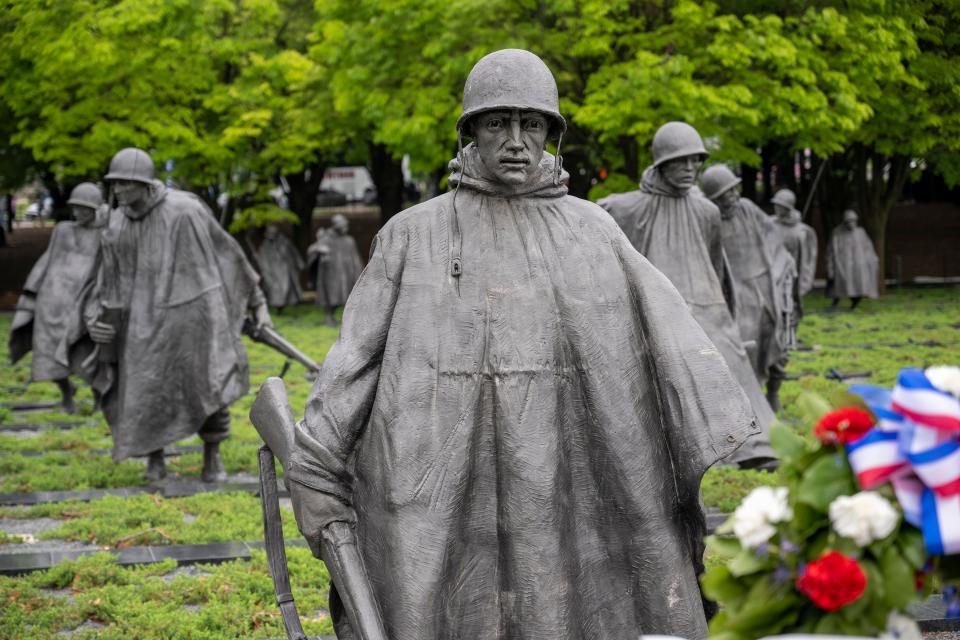Korean War is never forgotten by families of veterans
![In 2020, sisters Donna Carpenter (from left), Cheryl Stein and Angie Barron visited the Korean War Memorial at Veterans Park, where their uncle, U.S. Army Pvt. Norbert Theisen, who died in 1951 as a prisoner of war, is memorialized. [MONROE NEWS PHOTO BY TOM HAWLEY]](https://s.yimg.com/ny/api/res/1.2/Focq1MpEdRUXvTPbWz70wQ--/YXBwaWQ9aGlnaGxhbmRlcjt3PTEyNDI7aD03MzM-/https://media.zenfs.com/en/the-monroe-news/8e5039f7130a1bdcd3d30403d007563b)
The Korean conflict is often called “America’s Forgotten War.” For the families of Americans killed or missing there, it is anything but forgotten.
It has been seven decades since the Korean conflict began in 1950, and finally ended three years later with an armistice between the United States, North Korea and China. The war came on the heels of World War II and involved 25 nations, with a cost of 2.2 million casualties.
The U.S., one of 22 United Nations Allies, lost 54,246 killed and 103,284 wounded. Over 7,000 Americans remain unaccounted for today.
U.S. Army Lt. Col. Timothy Washington, deputy director of the Defense Department’s 60th Anniversary of the Korean War Commemoration Committee that marked the anniversary of the armistice in 2013, notes the many effects of the conflict.
“The results have been 60 years of freedom for the Republic of Korea (South Korea) and 60 years of oppression for North Korea,” said Washington. “The Republic of Korea has been one of America’s most powerful allies ever since and has assisted us in many of our efforts, including Vietnam, the post-9/11 era, and Afghanistan.”
The war began on June 25, 1950, when North Korean forces attacked the South with an artillery barrage along the 38th parallel, the dividing line between the two sides since World War II. Seoul fell on June 28, and American ground troops entered the conflict three days later.
U.N. forces landed in southeast Korea at Pusan, practically the only area not in North Korean hands. A daring landing against high tides at Inchon on Sept. 15, 1950, helped launch a U.N. offensive on Seoul, and South Korea was liberated days later.
Red China entered the conflict that year, and a “grinding war” ensued in costly engagements like the Chosin Reservoir, considered by many observers as the most savage battle in modern warfare. Poor weather, including frigid temperatures, also defined the war.

Peace talks began in 1951 and were finalized with armistice on July 27, 1953, though no treaty was ever signed.
“The Korean War is the first time that America drew a line in the sand, literally, to stop Communist aggression,” said Washington. “It began a pivotal period in the Cold War, to stop the Communist threat and protect freedom.”
Tensions still flare frequently between North and South Korea. In 2014, there were over 29,000 American troops stationed on the Korean Peninsula.
“The war never really ended, even though the armistice was signed,” remarked Washington.
Some 5.7 million American troops were on active duty during the war. Over 1.8 million were in Korea, and less than 600,000 of them survive today. A total of 131 Americans were awarded the Medal of Honor.
Many believe the Korean War was “forgotten” because it was overshadowed by World War II and Vietnam. Washington, though, stresses that the Korean War is never overlooked by the Americans who fought in it.
“Those who were there certainly never forgot it,” said Washington, “and the families of the 7,000 unaccounted for haven’t forgotten it, either. It’s never forgotten by anyone who served there, or whose family was affected by it, even after so many years.”
Tom Emery is a freelance writer and historical researcher from Carlinville, Illinois. He may be reached at 217-710-8392 or ilcivilwar@yahoo.com.
This article originally appeared on The Monroe News: Tom Emery: Korean War is never forgotten by families of veterans

